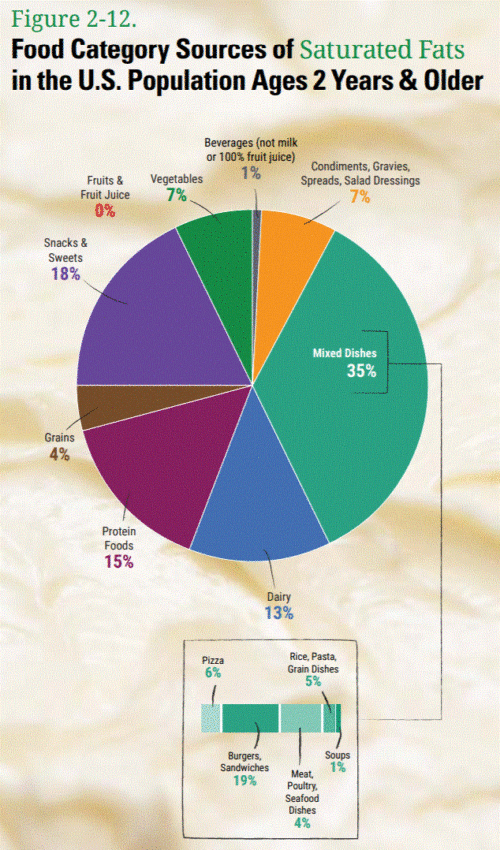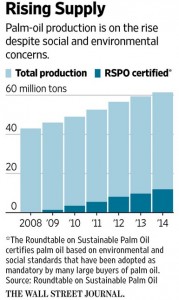Let’s take a look at a rare industry-funded study with results contrary to the interests of the funders.
It addresses the question: Is naturally occurring trans fat from meat and dairy products healthier than industrially produced trans fat?
The answer: not really.
The study
Vaccenic acid and trans fatty acid isomers from partially hydrogenated oil both adversely affect LDL cholesterol: a double-blind, randomized controlled trial. Sarah K Gebauer, Frédéric Destaillats, Fabiola Dionisi, Ronald M Krauss, and David J Baer. Am J Clin Nutr, November 11, 2015, doi: 10.3945/ajcn.115.116129.
- Conclusions: Total cholesterol (TC), LDL cholesterol, triacylglycerol, lipoprotein(a), and apolipoprotein B were higher after VA [vaccenic acid] than after iTFA [industrial trans fatty acids]; high-density lipoprotein (HDL) cholesterol and apolipoprotein AI also were higher after VA. Compared with control, VA and iTFA both increased TC, LDL cholesterol, ratio of TC to HDL cholesterol, and apolipoprotein B…VA also increased HDL cholesterol, apolipoprotein AI, apolipoprotein B, and lipoprotein(a)…whereas iTFA did not. c9,t11-CLA [conjugated linoleic acid] lowered triacylglycerol…and had no effect on other lipoprotein risk factors.
- Funding: Supported by USDA, Dairy Management Inc., Nestlé, and Dairy Australia. The funding organizations had no role in the conduct of the study; collection, management, analysis, and interpretation of the data; or decision to submit the manuscript for publication.
Background
Everyone agrees that hydrogenated fats containing trans fatty acids (industrial trans fatty acids or iTFAs) raise the risk of LDL-cholesterol (the bad one) and, therefore, the risk of coronary artery disease. But what about the naturally occurring trans fats that occur in meat and dairy products as a result of bacterial hydrogenation of fats in the rumens of ruminant animals (ruminant trans fatty acids or rTFAs)?
Some studies suggest that rTFAs do not raise the risk of coronary disease. This study tests that hypothesis. It found that the major rTFA, vaccenic acid, does indeed raise risk factors for coronary artery disease almost or more than do iTFAs.
To make sense of the study, you need to know:
- In iTFAs, the two major trans fats are elaidic acid 25%, and vaccenic acid 10%
- In rTFAs, the trans fats are vaccenic acid 45% and elaidic acid 5%
- Therefore, vaccenic acid is the major trans fat in rTFAs
What about Conjugated Linoleic Acid (CLA, or rumenic acid)?
The study also looked at intake of another rTFA, conjugated linoleic acid, which seems to have more benign properties but is present in such small amounts that it hardly makes a difference. Although this study found CLA to have no effect on risk factors for coronary heart disease, a study from independently funded investigators judged it to have effects similar to that of other rTFAs.
What took so long to get this study published?
David Baer, who works for USDA, is the senior author on this paper. I saw a slide presentation he did on this study in 2010. Its results were already available.
In 2011, his group wrote a review of ruminant trans fats, but did not report these results (they were known, but not published).
In 2012, Dr. Baer wrote about ruminant trans fats, disclosed his dairy industry funding, but also did not report these results. He concluded:
It is still difficult to draw definitive conclusions about the role of rTFAs in modulating risk of cardiovascular disease as mediated through changes in LDL and HDL cholesterol. Intake of these fatty acids is typically low in the diet.
I heard about this study last summer and wondered whether its funders were holding up publication. I called Dr. Baer and asked. He said the funders had nothing to do with the delay. Instead, life had intervened—collaborators left, he was busy with other things, and was having trouble getting the paper published.
The bottom line
The study was done with purified vaccenic acid, not dairy fat, in amounts higher than those likely to be consumed in diets. The authors say
Evidence…suggests that VA [vaccenic acid] consumed in amounts and foods typically found in the diet is inversely or not associated with CVD risk.
That’s one possible interpretation, but check the title of the editorial accompanying the paper: “In equal amounts, the major ruminant trans fatty acid is as bad for LDL cholesterol as industrially produced trans fatty acids, but the latter are easier to remove from foods.”
The funders of this study must be disappointed. It was undoubtedly difficult and expensive to do, since it involved synthesis of pure vaccenic acid and a clinical trial of more than 100 subjects.
The funders must have hoped the study would show vaccenic acid to be as benign or even healthier than conjugated linoleic acid. They bet wrong on this one.
This brings the score to 80:7 (sponsored studies with results favorable to the sponsor vs. those unfavorable).



